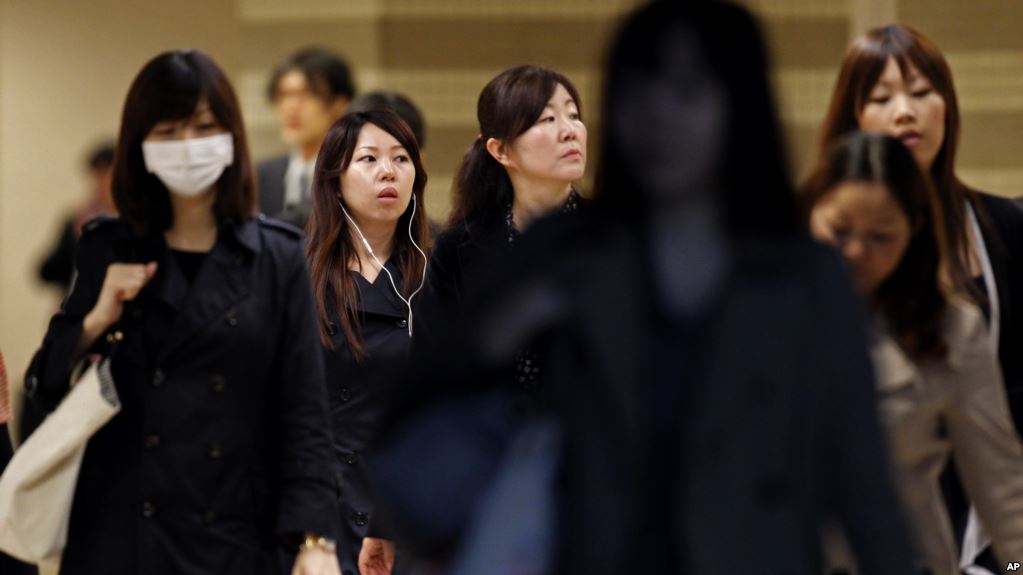
When your job kills you! A Japanese woman dies from overwork.
More than three years after the official ruling, Japan Broadcasting Corp. (NHK) disclosed on the air on Oct. 4 that the death of one of its reporters in 2013 of heart failure was blamed on overwork.
The admission will likely refuel calls for a halt to longstanding workplace practices to put in long working hours common in media-related companies.
The public broadcaster announced the death of Miwa Sado, 31, during its weekday 9 p.m. news program in the first disclosure of her death, which labor authorities ruled was attributable to overwork, or “karoshi.”
Labor authorities found that she put in more than 150 hours in monthly overtime right before her death.
Asked about the delay in the announcement, an NHK public relations official told The Asahi Shimbun, “We refrained from making it public because the bereaved family initially indicated that they preferred it that way.
“But we decided that we needed to disclose it as we are pushing the program to reform the workplace and a way of working, which was spurred by Sado’s death.”
Sado died of congestive heart failure in her apartment in Tokyo around July 24, 2013. She was found collapsed in her bed on July 25, when a concerned friend rushed to her residence after she became unable to be reached.
Sado joined NHK, which is based in Tokyo’s Shibuya Ward, in 2005 after graduating from elite Hitotsubashi University as a law major in March that year.
She had covered Tokyo metropolitan government affairs after she was transferred to a new post in July 2010.
In 2013, her assignment included coverage of the Tokyo metropolitan assembly election on June 23 and the Upper House election on July 21.
According to her parents, their daughter was extremely busy at that time covering candidates running in the elections and their supporters, shooting footage of campaign speeches and attending in-house meetings forecasting the number of votes candidates would garner.
The Shibuya Labor Standard Inspection Office found that Sado logged 159 hours and 37 minutes in overtime over a month from late June.
For a month from late May, the tally totaled 146 hours and 57 minutes.
Those numbers far exceeded the threshold of 100 hours overtime a month or 80 hours overtime on average over the two to six months in the national guidelines for determining karoshi.
“She was under circumstances that she could not secure enough days off due to responsibilities that required her to stay up very late,” the Shibuya labor office stated. “It can be inferred that she was in a state of accumulated fatigue and chronic sleep deprivation.”
Sado was described as someone who rarely complained, according to her father.
But he became anxious about her well-being after she wrote in an e-mail on June 27, the day after her birthday, “I am too busy and stressed out and think about quitting my job at least once a day, but I guess I have to hang on.”
When Sado was discovered in her bed, she was holding a cellphone in her hand, according to her mother.
“My daughter may have wanted to call me,” the mother said. “When I think about it, I feel gut-wrenching pain.”
The news on Sado’s death comes after the nation was shaken by the ruling of the suicide of a 24-year-old employee of advertising giant Dentsu Inc. in December 2015 as karoshi. The case surfaced after labor authorities delivered the ruling in September last year.
NHK gave detailed coverage of the Dentsu employee’s karoshi, but it did not disclose Sado’s death from overwork within the company until her parents strongly requested it.
The announcement of Sado’s death followed her parents’ decision to press the broadcaster since this summer to ensure that all NHK employees be informed about her karoshi.
They also called on the TV station to voluntarily make it public, continuing talks with NHK senior officials over when and how up until on Oct. 4.
After their daughter’s death, network officials told the parents that they were taking measures to prevent employees from working long hours.
But a former colleague of Sado told them in the summer that while the program has been in place, the network did not notify its employees that Sado’s death was what prompted the reform.
“NHK should proceed with the reform program after fully informing all its staff of our daughter’s death and doing serious soul-searching,” her father said. “The reforms will never be complete unless they are based on the deep remorse over the death of an employee.”
In the two-minute coverage of Sado’ death during News Watch 9, a newscaster said, “We decided to disclose (her death) to all of our employees and to the public to share the resolve company-wide so as to prevent a recurrence and follow through with the reform.”













